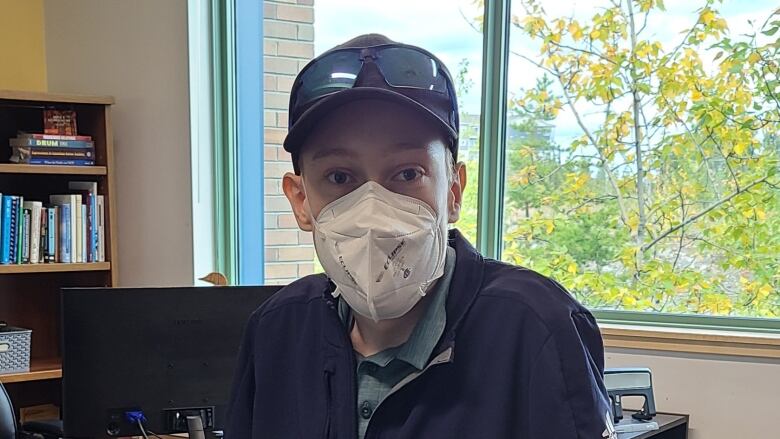After 3 years of remote pandemic learning, this N.W.T. student is back in class
Riley Oldford made the tough decision to learn in person this year

Yellowknifer Riley Oldford has spent most of high school learning remotely, but this first day of school is a special one he's going into Grade 12, and he's doing it in person.
Riley, who lives with cerebral palsy and chronic lung disease, stayed strictly isolated to avoid the increased risk of complications from COVID-19.
Going to in-person learning at cole Sir John Franklin High School brings "mixed feelings" because his pre-existing lung damage could lead to greater complications if he gets COVID-19.
He's looking forward to "spontaneous things" like hanging out with friends and having variety in his day.
Riley has been staying away from large gatherings and school, among other places, since March 2020.
"The biggest difference was just not being around friends," he said.
"I've managed to avoid COVID for the past two and a half years [but] I could get it within a couple of weeks at school because you can't really control anyone around you.
He'll be wearing a KN95 mask as much as possible and has to eat away from others to reduce the risk of transmission.
"I'll probably find little spots like a little corner to eat just because when you're eating, you're more likely to get something," he said.
He finally decided it would be OK to return after two and a half years at home, the COVID-19 vaccine rollouts and a steadier pandemic situation.
"There probably won't be a perfect time, but it's become quite clear that COVID will be around for a while," he said.
"I'll try to keep my distance, but there's not much else you can do."
Attending school in person will help him learn with greater ease, said Riley, especially math and chemistry courses.
"With certain classes, it was harder to learn online," he said.
Riley is interested in political science and foreign affairs, air traffic control, or a career in city planning and accessibility.
"I've noticed many issues with accessibility pretty much everywhere," he said.

Riley's mother, Sharon Oldford works at cole Sir John Franklin School where there are roughly 600 people in the building on a regular school day.
Going back to the classroom also means more social time.
"He hasn't had that experience of hanging out there, being with his friends," she said.
Sharon is keeping an eye on national trends for people with the same conditions as Riley. If casesspike, or people begin to get sick, they'll consider changing this in-person arrangement.
Still, Riley has to take precautions to limit his exposure to large groups.
Her son will leave classes a bit early or a bit late, to avoid the hallway rush as people switch classes because it takes him 20 minutes to cross the school.
Many teachers have been accommodating and he uses his own laptop device.
She said people should be respectful if a person is masking.
"The biggest thing right now is really being cautious of other people's needs," she said.
It can be as simple as asking if you can sit in an empty space near someone who is distancing themselves from others, she said.
Sharon said that many people have had COVID-19, and while some people describe their illness as being "just like a cold" it can be more severe for others, where contracting COVID-19 could mean being put on a ventilator or dying.
"Just remember what different people's circumstances are If you're not feeling well either, stay at home. And if you do have to be out, wear a mask and respect other people's space so that they can try to stay safe."
With files from Loren McGinnis.












_(720p).jpg)


 OFFICIAL HD MUSIC VIDEO.jpg)
.jpg)



























































































